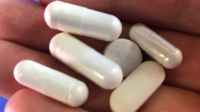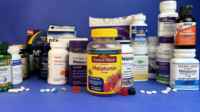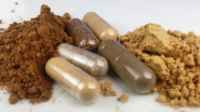
Answer:
Many supplements have been evaluated for their effects in treating fibromyalgia, a condition characterized by tender muscles, fatigue, and sleep disturbances and that is often treated with antidepressants. However, as explained below, there is no compelling evidence that any supplement (aside from vitamin D in certain circumstances) will improve symptoms of fibromyalgia. In addition, some supplement may worsen symptoms of fibromyalgia.
We've summarized the effect of each supplement below, and you can use the links for more details.
Supplements that might help
Vitamin D supplementation might improve pain symptoms of fibromyalgia among people with low levels of vitamin D, but there is no evidence that vitamin D supplement is beneficial among people with adequate levels of vitamin D.
One study suggested that taking 5-HTP along with certain antidepressants may improve pain symptoms among people with fibromyalgia better than either 5-HTP or antidepressants alone. However, the study did not include a placebo control group and not all conclusions asserted by the researchers were supported by data analysis, so it's not possible to know with certainty that 5-HTP is beneficial.
Taking creatine may slightly improve muscle strength in people with fibromyalgia, but it doesn't appear to improve other symptoms such as pain or sleep quality.
Several small studies suggested that CoQ10 may improve symptoms of fibromyalgia when used alone or along with the standard treatment.
Preliminary research suggested that taking acetyl-L-carnitine improved depressive symptoms, but not anxiety or pain, in people with fibromyalgia.
A small, preliminary study suggested that SAMe (S-adenosylmethionine) slightly reduced pain at rest and fatigue, but not pain during physical activity, depression, or sleep among people with fibromyalgia.
One study suggested that supplementation with reishi mushroom powder modestly improved some measures of physical fitness among women with fibromyalgia, but it is unclear if reishi powder improves symptoms such as pain, stiffness or tenderness, as these outcomes were not measured.
Taking melatonin may reduce pain and improve self-reported "fitness" among people with fibromyalgia, although somewhat higher doses than what is typically used may be needed for benefit. Such higher doses may increase the risk of side effects such as drowsiness, headache, dizziness or gastrointestinal issues.
In one study, fewer people supplementing with Pycnogenol and standard treatment reported symptoms such as pain and stiffness compared to those receiving only standard treatment. However, because the study was not blinded, placebo-controlled, or randomized, it's not possible to determine if Pycnogenol actually improved symptoms.
A pilot study reported that applying magnesium as magnesium chloride spray improved cramps and fatigue among women with fibromyalgia, but because the study was not placebo-controlled, it's not possible to determine if topical magnesium actually improves symptoms.
One study showed that applying 0.075% capsaicin (the substance that gives chili peppers their heat) to affected areas three times daily for 6 weeks, in addition to taking standard medication, improved pain in people with severe fibromyalgia better than taking medication alone. However, the study was not placebo-controlled, which limits the reliability of the results (Casanueva, Rheumatol Int 2013).
Cellfood has been promoted as improving symptoms of fibromyalgia based on results from a small study showing that Cellfood reduced symptoms among women with this condition, but these findings are not reliable due to poor study quality.
Supplements that do not seem to help
Iron deficiency has been associated with an increased risk of fibromyalgia in women, but supplementing with iron has not been shown to treat fibromyalgia. Note, however, that many symptoms of iron deficiency, such as tiredness or weakness, resemble fibromyalgia symptoms.
One study showed that taking ginseng does not improve fatigue, ability to sleep, or number of tender points among people with fibromyalgia compared to placebo. Although ginseng modestly improved anxiety, a greater improvement was seen for people taking the standard treatment (Braz, Braz J Psychiatry 2013).
Although alpha-lipoic acid is promoted as protecting brain and nerve tissue from free radical damage through its antioxidant effects, it does not appear to have benefit for fibromyalgia (Gilron, Pain, 2021).
Supplements with no clear evidence of benefit
Symptoms of thiamin (vitamin B-1) deficiency are similar to some symptoms of fibromyalgia, and low levels of thiamin have been linked with fibromyalgia. However, there are no clinical studies showing that thiamin supplementation is beneficial for people with fibromyalgia.
Supplements that may worsen fibromyalgia symptoms
A small percentage of people taking Prelief, a product containing calcium glycerophosphate and promoted as a "food de-acidfier," have reported a worsening of fibromyalgia symptoms, according to a survey.
Join today to unlock all member benefits including full access to all CL Answers and over 1,400 reviews.
Join NowAlready a member? Sign In Here.
Join now at www.consumerlab.com/join/

.jpg?size=thumbnail)


















Submit your comment
This feature is restricted to active members.
Join now to add comments and get all member benefits, including over 1,400 reviews.
Join NowAlready a member? Sign in here.